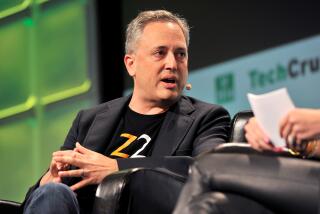Whitman, Brown have ties to Goldman Sachs
- Share via
As a main theme of his campaign for governor, Jerry Brown has attacked Wall Street bankers for fueling the nation’s economic troubles.
But he has avoided mentioning Goldman Sachs, the bank that is a recent focus of scrutiny, even though it is one of the biggest liabilities for Meg Whitman, the leading Republican candidate for governor, who sat on the company’s board.
Brown, a Democrat and California’s attorney general, also has connections to Goldman, which was charged with civil fraud last week by the Securities and Exchange Commission. The links are his sister and a complicated financing deal made by the city of Oakland, where he served as mayor for eight years.
That deal, known as an “interest rate swap,” was supposed to guarantee Oakland stability in its debt payments but is now costing the cash-strapped city $5 million a year. The agreement, which goes until 2021, has an estimated cancellation cost of $19 million. The city is trying to renegotiate it, and union officials representing government employees are calling on Goldman to let Oakland and other municipalities out of such agreements.
The swap, like those entered into by many governments, began in 1998, the year before Brown took office. City officials renegotiated it in 2003, right before his sister, Kathleen Brown, the former state treasurer, began working for Goldman as the West Coast head of municipal finance. In 2005, when the city paid off the debt Goldman had arranged, it left the interest rate swap in place.
Municipal officials said it made sense to do so because they would have had to pay $15 million to end the deal. That decision also continued a steady revenue stream for Goldman Sachs that has turned more favorable for the company and less so for the city as the economy has eroded.
Whitman’s spokesman, Tucker Bounds, called the arrangement “a big-money deal for Wall Street that is costing California taxpayers millions of dollars a year.”
“No matter how you look at it, Jerry and his sister were on both ends of a bad deal for taxpayers, and Goldman Sachs pocketed millions,” Bounds said.
Besides being mayor, and appointing the city administrator and finance officials who oversaw city borrowing, Brown was president of the Oakland Joint Powers Financing Authority, albeit in a nonvoting capacity, when it renegotiated the deal and repaid Goldman’s debt in 2005. His campaign spokesman, Sterling Clifford, said Brown had nothing do with any of it.
Clifford said any suggestion by the Whitman campaign that Brown was involved with the Oakland deal is “a total fabrication.”
“Whitman wants to blame everyone else but won’t own up to her own deep entanglement with questionable practices at Goldman Sachs,” he said.
Goldman is already a campaign issue. Whitman, the billionaire ex-chief of EBay, has had extensive ties to the company. Her name surfaced at the center of a national financial scandal in 2002 when congressional investigators cited a deal she arranged with Goldman that gave her early access to initial public stock offerings.
Experts said the deal was a conflict because Goldman was seeking millions of dollars in banking business from EBay at the time, and the profits Whitman netted arguably belonged to shareholders. Whitman had a seat on the Goldman board when the scandal broke and resigned soon after.
Bounds downplayed Whitman’s time on the board, saying it was for “15 short months nearly 10 years ago.” He said she would end her investments in Goldman Sachs if elected,” and isn’t “some kind of Wall Street banker.”
Interest rate swaps allow municipalities to trade fluctuating interest rates for the certainty of fixed ones. The problem for many governments has been that when Federal Reserve officials drastically reduced interest rates in response to the financial crisis, banks reaped the benefits and municipalities were stuck with the higher fixed rates.
Defenders of such deals say they were beneficial for municipalities based on economic conditions at the time and that no one could have predicted the dramatic interest rate drops ahead.
Oakland has long since retired the $187-million debt that was originally attached to its interest rate swap, but since the deal is still in place, the city now pays nearly 5.7% on what the debt would have been. In return, Goldman pays the agreed-upon fluctuating interest rate, which is almost nothing.
Oakland and Goldman officials say they believe the swap has benefited Oakland overall, though they provided no statistics to show that. The Service Employees International Union, which supports Brown, has called on banks to let municipalities off the hook. The union has estimated that the deal has cost Oakland $38 million overall.
Bahar Tolou, a researcher for the union on banking issues, said many municipalities were “hoodwinked.”
“For the most part, these have all gone bad and Wall Street is making huge profits,” she said. But she added, “It wouldn’t be fair to hold Jerry Brown accountable for something no one saw coming.”
Times staff writer Evan Halper contributed to this report.
More to Read
Get the L.A. Times Politics newsletter
Deeply reported insights into legislation, politics and policy from Sacramento, Washington and beyond. In your inbox twice per week.
You may occasionally receive promotional content from the Los Angeles Times.










